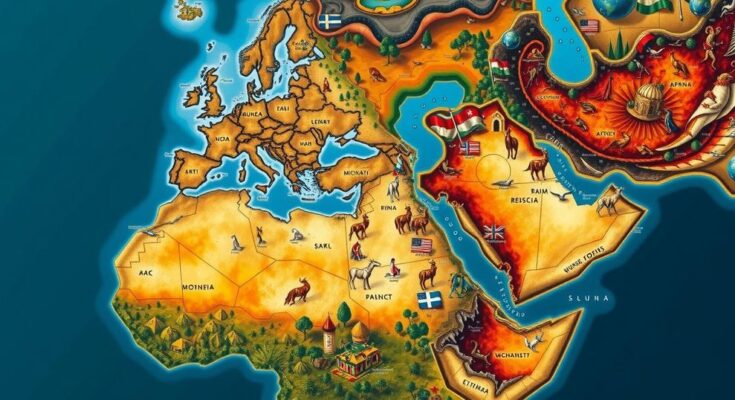The article discusses the formation of an alliance involving Egypt, Eritrea, and Somalia in response to Ethiopia’s expanding influence, particularly regarding the Grand Ethiopian Renaissance Dam. This coalition indicates Egypt’s efforts to restore its regional presence through military cooperation while navigating complex Nile water governance concerns.
In early October, a trilateral summit convened in Asmara, attended by the presidents of Egypt, Eritrea, and Somalia, who committed to military cooperation in Somalia’s counterterrorism initiatives, agreeing to deploy troops under the African Union mission. This meeting was perceived as a strategic maneuver to counteract Ethiopia’s expanding influence in the region, particularly following Ethiopia’s memorandum with Somaliland to establish a military base along its coast in exchange for recognizing Somaliland’s independence. Cairo has long been engaged in a contentious diplomatic dispute with Ethiopia over the Grand Ethiopian Renaissance Dam (GERD), which Egypt considers a direct threat to its national security. The recent implementation of the Entebbe Agreement managing Nile River waters has further exacerbated anxieties in Cairo, as it is viewed as detrimental to water security for both Egypt and Sudan. This summit forms part of Egypt’s broader strategy to rebuild alliances across Africa, shifting toward military and diplomatic partnerships with neighboring countries since 2019, as highlighted by Iman Abdel Azim, a political science professor at Cairo University. The agreements signed between Egypt and Somalia in August 2023 for joint military defense illustrate this trend, alongside the shipment of military equipment to Somalia. In a similar vein, Egypt solidified ties with Eritrea through a mutual defense agreement following high-level diplomatic talks. The interactions above underscore Cairo’s commitment to reassert its influence as Ethiopia asserts its position in the Horn of Africa, often through unilateral actions such as the construction and filling of the GERD, which critics say has significantly undermined Egypt’s water supply. Abbas Sharaky from Cairo University observed that the GERD initially aimed to boost Ethiopia’s development, but it has evolved into a contentious nationalist project that lacks essential environmental assessments. Egypt, therefore, has had to rely increasingly on its existing water reserves while investing heavily in alternative solutions to mitigate the impending water shortages and related agricultural crises. As negotiations falter, the sentiment in Cairo is increasingly one of urgency, with Ambassador Mona Omar illustrating that Egypt finds itself “at the end of the road” after years of unsuccessful diplomacy. In light of Ethiopia’s strategic advances in basin agreements and military partnerships, the situation prompts serious reflections on Egypt’s diminished influence in Africa compared to the era of President Gamal Abdel Nasser, who championed a pan-African framework. The evolving geopolitical landscape presents new challenges and opportunities, as noted by experts. Amani El-Tawil from the Al-Ahram Centre suggests Ethiopia is filling a vacuum in regional influence left by Egypt, evidenced by its dealings with Somaliland. Egypt’s recent military collaborations may serve as both a safeguard against potential conflict and a means to exert diplomatic pressure on Ethiopia regarding the GERD and water rights discussions. As Egypt navigates these tensions, a new axis is evidently forming in the region, with both nations courting alliances to bolster their positions. Ethiopia’s dealings, particularly those perceived as expansionist or interventionist, have prompted neighboring countries to reassess their alliances, bringing them closer to Egypt amidst the shifting dynamics in the Horn of Africa.
The article discusses the recent trilateral summit involving Egypt, Eritrea, and Somalia that signals an increasing military and strategic collaboration among these countries in response to Ethiopia’s growing regional power. The dynamics of this shifting alliance result from long-standing disputes over water security stemming from the Ethiopian Grand Renaissance Dam and the Entebbe Agreement. The historical context of Egypt’s influence in Africa illustrates the challenges it faces in regaining its footing in light of perceived encroachments from Ethiopia.
In conclusion, the alliances being formed among Egypt, Eritrea, and Somalia represent a strategic collective response to perceived Ethiopian dominance in the Horn of Africa. Egypt’s focus on military cooperation is a reflection of its urgent need to bolster regional influence while mitigating the challenges posed by the GERD and declining water resources. As international negotiations stagnate, these partnerships could potentially reshape power dynamics in the region, making the situation critical for Ethiopia and neighboring states.
Original Source: www.newarab.com




